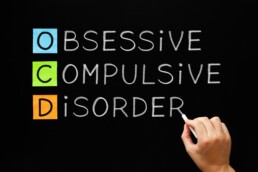- Home
- OCD Treatment
Obsessive Compulsive Disorder: OCD Treatment in San Diego
You Can Find a Balance Again.
Crownview Medical Group Is Here to Help
Are repetitive thoughts and compulsive behaviors interfering with your everyday life? Do you find yourself so obsessed with cleanliness, order or repetition that it’s stealing time and energy from other things that you would rather be doing?
If so, it may be time to consider OCD treatments for the issues you are experiencing.
Left untreated, OCD can cause serious problems with relationships, work, social engagements, and even your health. Unfortunately, OCD does not just “go away” over time. If you or a loved one struggle with OCD, compassionate and proven care may be the right solution for you.
We're located right here in Coronado
Understanding the Causes of OCD
Like other mental health conditions, OCD is complex and nuanced, and there is not a single, definitive list of causes. According to current research, genetic, neurological, and environmental factors all play a crucial role in the development of OCD.
If you have a family history of OCD, you’re at a higher risk for developing it yourself. In terms of neurology, researchers have observed differences in brain structure and function, particularly in areas responsible for regulating behavior and processing emotions, in those with OCD. Environmental factors, including life stresses and traumatic events, can also contribute to the onset of OCD.
We Help You Minimize Obsessions and Compulsions.
At Crownview Medical Group, we have the specialized training and experience to help you or your child manage Obsessive Compulsive Disorder. Using the latest evidence-based treatment, we help you minimize your obsessive thoughts and reduce compulsive behaviour.
Though your compulsive feelings and activities may seem overwhelming and impossible to stop at this moment, you can restore balance to your life through our proven OCD treatment program. OCD will not just “fade away.” But with quality treatment, you can regain your life.
2.2 Million Americans Suffer From OCD. Men and Women Suffer From OCD in Equal Numbers.

OCD Signs and Symptoms
OCD often include symptoms such as the following:
- intense fear of germs
- strong fear of hurting someone or his or herself
- incessant repetition (certain words, phrases, rituals)
- obsessing on fear of loss (family member, friend, etc.)
- a sense of hopelessness
- intense feeling of embarrassment
- depression
- low self-confidence
- low self-esteem
- feeling of loss of control
- anxiety
- feeling of dread
- sore and raw hands due to constant washing
- double checking items (locks locked, lights off, toaster unplugged, etc)
- continual counting of items or actions
- performing rituals over and over until completed correctly
- being hyper-vigilant about arranging items in a particular manner
Effective Treatment Strategies for OCD
At Crownview Medical Group, we take a personalized and evidence-based approach in treating OCD, combining Cognitive Behavioral Therapy (CBT) with Exposure and Response Prevention (ERP) techniques, supported by medication management when necessary.
Recognizing the Right Time to Seek Treatment for OCD
You don’t have to keep suffering. If OCD symptoms are starting to significantly impact your daily life, relationships, work, or overall wellbeing, it’s time to seek professional help. Whether you’re assessing yourself or a loved one, look out for common indicators, such as spending excessive time on compulsive behaviors, intense distress due to obsessive thoughts, and a noticeable decline in quality of life.
Early intervention can prevent symptoms from worsening and pave the way for a more effective treatment outcome. If you or a loved one is experiencing these challenges, seeking help early can have lasting positive effects.
OCD Treatment in San Diego: Navigating Toward a Brighter Tomorrow
OCD is an extremely challenging but treatable condition. At Crownview Medical Group, we are dedicated to providing comprehensive, compassionate care to help you or your loved one manage and overcome the symptoms of OCD. Contact us today to learn more about our treatment programs and to schedule a consultation. Your journey toward a balanced and fulfilling life starts here.
FAQs About OCD Treatment in San Diego
OCD is typically a chronic disorder, meaning it can persist over a long period. While symptoms may vary in intensity over time, complete remission without treatment is rare. With proper treatment, however, many individuals experience significant relief from symptoms and can lead fulfilling lives.
While self-care strategies, like stress management and mindfulness, can help manage symptoms, OCD usually requires professional treatment for significant improvement. Self-treatment alone is often insufficient, and seeking professional guidance is crucial for effective management.
At Crownview Medical Group, we believe in a personalized treatment plan combining Cognitive Behavioral Therapy (CBT) with Exposure and Response Prevention (ERP) techniques, supported by medication management when necessary. This approach has shown high efficacy in reducing OCD symptoms and improving quality of life.
OCD flare-ups can be triggered by stress, life transitions, hormonal changes, or other mental health issues like depression or anxiety.
OCD can change over time, but it doesn’t necessarily get worse with age. In fact, with the right treatment and coping strategies, many people find that their ability to manage OCD symptoms improves over time. However, neglecting treatment can lead to a worsening of symptoms, regardless of age.
The duration of OCD treatment varies depending on the individual’s response to therapy and the severity of their symptoms. Some may notice improvements within a few weeks, while others might need longer. Consistency and commitment to treatment are key to achieving the best outcomes.
Medication is not always necessary for treating OCD, but it can be beneficial, especially in moderate to severe cases of OCD. SSRIs (Selective Serotonin Reuptake Inhibitors) are commonly prescribed. The decision to use medication is made on a case-by-case basis in consultation with a healthcare professional.
INPATIENT & OUTPATIENTTREATMENT
158 C Avenue, Coronado
CA 92118


 Myriame Nicolas, PMHNP-BC
Myriame Nicolas, PMHNP-BC Charlie Perez, PMHNP-BC
Charlie Perez, PMHNP-BC Kelvin Poon, MSN, PMHNP-BC
Kelvin Poon, MSN, PMHNP-BC


 Apneet Mann, FNP-C
Apneet Mann, FNP-C Kimberly Umansky, FNP-C
Kimberly Umansky, FNP-C Joanne Talbot Miller, M.A., LMFT
Joanne Talbot Miller, M.A., LMFT Rachael Hueftle, NP
Rachael Hueftle, NP J. Heather Fitzpatrick, LCSW
J. Heather Fitzpatrick, LCSW Agata Nowakowska
Agata Nowakowska Brianna Meacham
Brianna Meacham Maha Moses, PhD
Maha Moses, PhD Rebecca McKnight, PsyD
Rebecca McKnight, PsyD Tiffany Holm N.P.
Tiffany Holm N.P. Dede Echitey, PMHNP-BC
Dede Echitey, PMHNP-BC


